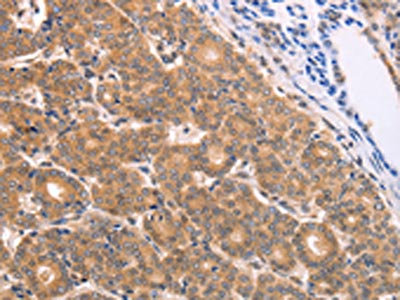BTG3 Antibody
-
货号:CSB-PA969912
-
规格:¥1100
-
图片:
-
其他:
产品详情
-
Uniprot No.:Q14201
-
基因名:BTG3
-
别名:Abundant in neuroepithelium area protein antibody; ANA antibody; BTG family member 3 antibody; Btg3 antibody; BTG3_HUMAN antibody; Protein BTG3 antibody; Protein Tob5 antibody
-
宿主:Rabbit
-
反应种属:Human
-
免疫原:Fusion protein of Human BTG3
-
免疫原种属:Homo sapiens (Human)
-
标记方式:Non-conjugated
-
抗体亚型:IgG
-
纯化方式:Antigen affinity purification
-
浓度:It differs from different batches. Please contact us to confirm it.
-
保存缓冲液:-20°C, pH7.4 PBS, 0.05% NaN3, 40% Glycerol
-
产品提供形式:Liquid
-
应用范围:ELISA,IHC
-
推荐稀释比:
Application Recommended Dilution ELISA 1:1000-1:5000 IHC 1:25-1:100 -
Protocols:
-
储存条件:Upon receipt, store at -20°C or -80°C. Avoid repeated freeze.
-
货期:Basically, we can dispatch the products out in 1-3 working days after receiving your orders. Delivery time maybe differs from different purchasing way or location, please kindly consult your local distributors for specific delivery time.
相关产品
靶点详情
-
功能:Overexpression impairs serum-induced cell cycle progression from the G0/G1 to S phase.
-
基因功能参考文献:
- Data show that miR-139 can repress the proliferation of hepatocellular carcinoma (HCC) cells via directly inhibiting the expression of ANA protein, human Add B-cell translocation gene 3 protein (BTG3). PMID: 29268856
- Taken together, the results of our study suggest that BTG3 overexpression could inhibit cell proliferation and invasion and promotes cell apoptosis in EOC cell, possibly by regulating the AKT/GSK3beta/beta-catenin signaling pathway PMID: 28183228
- BTG3 expression might contribute to CRC carcinogenesis. BTG3 knockdown might strengthen the aggressive colorectal cancer behavior. PMID: 29270670
- BTG3 is a direct downstream target of miR-106b-5p. PMID: 29197876
- BTG3 overexpression inhibited tumor growth of SW620 cells by suppressing proliferation and inducing apoptosis. It was suggested that down-regulated BTG3 expression might be considered as a marker for colorectal carcinogenesis. PMID: 28407690
- ANA and ASMA evaluation in patients with liver transplantation and no history of autoimmune disease has no clinical relevance, since it varies in time and is not related to any risk factors or liver injury. Routine autoimmunity evaluation should be avoided. PMID: 28337446
- BTG3 overexpression might reverse the aggressive phenotypes and be employed as a potential target for gene therapy of gastric cancer. PMID: 25904053
- The suppressed migration and invasion abilities found in BTG3-overexpressing esophageal adenocarcinoma cells. Our findings suggested that BTG3 is suppressor in the progression of esophageal adenocarcinoma PMID: 25701359
- BTG3 binds and suppresses AKT, a kinase frequently deregulated in cancers. PMID: 25569101
- Down-regulation of BTG3 promotes cell proliferation, migration and invasion in gastric cancer. PMID: 25238703
- BTG3 protein expression may be considered as a good marker to indicate the favorable prognosis of epithelial ovarian carcinoma. PMID: 23657964
- These results disclosed an important role of BTG3 in lung tumorigenesis. PMID: 23810394
- BTG3-dependent CHK1 ubiquitination contributes to its chromatin localization and activation and a defect in this regulation may increase genome instability and promote tumorigenesis PMID: 23533280
- loss of BTG3 in normal cells induced cellular senescence, which was correlated with enhanced ERK-AP1 signaling and elevated expression of the histone H3K27me3 demethylase JMJD3/KDM6B PMID: 22020331
- by disrupting the DNA binding activity of E2F1, BTG3 participates in the regulation of E2F1 target gene expression. Therefore, our studies have revealed a previously unidentified pathway through which the activity of E2F1 may be guarded by activated p53. PMID: 17690688
- These data support the hypothesis that BTG3 may act to suppress tumorigenesis and that hypermethylation is an important mechanism for inactivation of BTG3 and perhaps other tumor suppressor genes. PMID: 18590053
- BTG3 is epigenetically silenced in renal cancer PMID: 19221000
显示更多
收起更多
-
蛋白家族:BTG family
-
组织特异性:Ubiquitous. High expression in the ventricular zone of the developing central nervous system. High in ovary, testis, prostate, thymus and lung.
-
数据库链接:
HGNC: 1132
OMIM: 605674
KEGG: hsa:10950
UniGene: Hs.473420
Most popular with customers
-
-
YWHAB Recombinant Monoclonal Antibody
Applications: ELISA, WB, IF, FC
Species Reactivity: Human, Mouse, Rat
-
Phospho-YAP1 (S127) Recombinant Monoclonal Antibody
Applications: ELISA, WB, IHC
Species Reactivity: Human
-
-
-
-
-





















